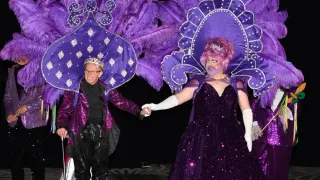
3 hours ago
The New Faces of Queer Politics: Rising LGBTQ+ Leaders Changing Representation at Every Level
READ TIME: 4 MIN.
In 2025, the United States witnessed an unprecedented surge in LGBTQ+ political representation, with a net gain of 107 LGBTQ+ elected officials taking office nationwide. This new wave of leaders marks a significant shift in the political landscape, as more openly LGBTQ+ individuals serve in government than ever before, from school boards to the halls of Congress. Their presence is not only historic but also transformative, ensuring that the voices and experiences of the LGBTQ+ community are represented in key policy decisions at every level of government .
“Our mission is to increase representation at all levels of government, not just to make history, but to make progress for our community,” said Annise Parker, President & CEO of LGBTQ+ Victory Fund, underscoring the importance of this new chapter in queer politics .
The 2024 election cycle saw at least 495 LGBTQ+ candidates win their races, including trailblazers who made history in their respective states and offices. The 119th Congress boasts 12 out LGBTQ+ members in the House of Representatives—its highest count ever—while Senator Tammy Baldwin of Wisconsin continues as the Senate’s lone openly LGBTQ+ member .
Among the most notable victories:
- Sarah McBride, Julie Johnson, and Emily Randall: These three lawmakers made history as they were sworn into Congress, joining a record cohort of openly LGBTQ+ legislators on Capitol Hill .
- Dr. Elizabeth Steiner: Elected as Oregon’s first openly LGBTQ+ state treasurer .
- Dave Upthegrove: Became Washington state’s first LGBTQ+ statewide officeholder, elected as Commissioner of Public Lands .
- Aime Wichtendahl, Kim Coco Iwamoto, and Wick Thomas: Elected as the first transgender or non-binary state legislators in Iowa, Hawaii, and Missouri, respectively, breaking barriers for gender-diverse representation in statehouses .
The election outcomes reflect a broader trend: LGBTQ+ political power is growing not just in progressive strongholds but in regions where representation has historically lagged. Wisconsin added seven new LGBTQ+ representatives, and eleven states increased their LGBTQ+ state legislative presence, with a net gain of 21 new LGBTQ+ legislators in 2025 .
State and local leaders are often the first line of defense against anti-LGBTQ+ legislation and rhetoric. In 2025, influential leaders such as Connecticut State Treasurer Erick Russell, Vermont State Treasurer Mike Pieciak, Michigan Attorney General Dana Nessel, and Arizona Attorney General Kris Mayes are at the forefront of protecting equality and standing up to hate .
In city halls and local councils, LGBTQ+ leaders are shaping policy and making history. Notable city officials on the 2025 LGBTQ+ Political Power list include:
- San Diego Mayor Todd Gloria
- San Antonio Mayor Gina Ortiz Jones
- Providence, Rhode Island Mayor Brett Smiley
- Columbus, Ohio Council President Shannon Hardin
- New York City Council Member Erik Bottcher
- Nashville City Councilmember Olivia Hill .
These leaders are not only advocating for LGBTQ+ rights but are also working to advance justice, equity, and opportunity for all constituents, often in the face of increasing legislative challenges and threats to equality .
The rise in LGBTQ+ political power is no accident—it is the result of sustained investment in leadership development and training. Organizations like the LGBTQ+ Victory Institute and the David Bohnett Foundation play a central role in equipping the next generation of queer leaders with the skills, networks, and resources needed to run successful campaigns and govern effectively .
The 2025 class of David Bohnett Leaders Fellows, for example, includes eight inspiring LGBTQ+ political leaders selected for executive education at the Harvard Kennedy School. Past fellows have gone on to serve at every level of government, including California State Commissioner of Insurance Ricardo Lara and Wisconsin Democratic Assembly Leader Greta Neubauer .
One of the 2025 fellows, Arizona State Representative Lorena Austin, embodies the intersection of advocacy, community, and policy. Austin’s background in Chicano/a Latino/a Studies and cross-sector leadership brings a vital perspective to the Arizona legislature, rooted in both lived experience and academic expertise .
The momentum for LGBTQ+ political representation extends beyond U.S. borders. The annual International LGBTQ+ Leaders Conference, hosted by the LGBTQ+ Victory Institute in Washington, DC, brings together more than 700 LGBTQ+ elected officials, advocates, and changemakers from across the globe .
This conference provides a powerful platform for sharing strategies, building coalitions, and celebrating collective achievements. In 2025, speakers include trailblazers such as Massachusetts Governor Maura Healey, highlighting the interconnectedness of LGBTQ+ political movements worldwide .
Workshops and panels at the conference address urgent issues facing the community, from healthcare access to combating legislative attacks, and showcase rising stars through awards such as the Tammy Baldwin Breakthrough Award .
Despite historic gains, LGBTQ+ elected officials continue to face significant challenges—including heightened threats and legislative efforts aimed at rolling back rights. The LGBTQ+ Victory Institute has highlighted the importance of safety and solidarity for LGBTQ+ officials, noting that the fight for equality is far from over .
Still, the growing presence of openly LGBTQ+ leaders at every level of government is a testament to the resilience and determination of the community. As more queer and transgender leaders take office, they bring essential lived experience to policy debates on issues ranging from healthcare and education to public safety and civil rights.
The new faces of queer politics are more than symbols of progress—they are catalysts for change, working to make government more responsive, inclusive, and just. Their historic victories pave the way for future generations of LGBTQ+ leaders and underscore the enduring truth: representation matters, and when queer people lead, everyone benefits.






